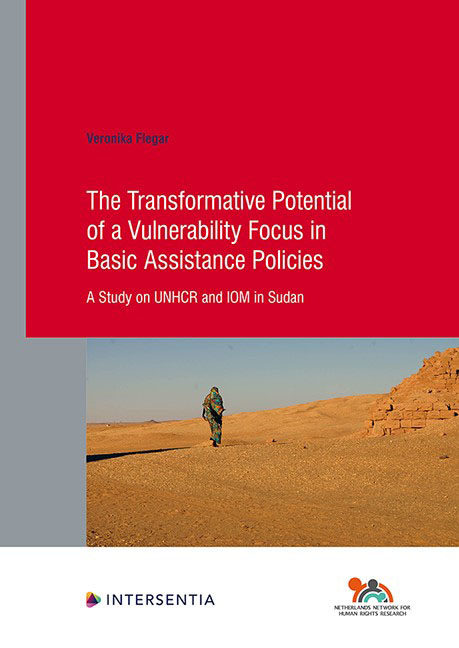 The Transformative Potential of a Vulnerability Focus in Basic Assistance Policies
The Transformative Potential of a Vulnerability Focus in Basic Assistance Policies Book contents
- Frontmatter
- Dedication
- Preface and Acknowledgements
- Contents
- List of Abbreviations
- List of Tables
- List of Figures
- Chapter 1 Introduction
- PART I NORMATIVE AND EMPIRICAL THEORY
- PART II BACKGROUND TO THE CASE STUDIES
- PART III CASE 1: ASSESSING AND ADDRESSING VULNERABILITY AT UNHCR KHARTOUM
- PART IV CASE 2: ASSESSING AND ADDRESSING VULNERABILITY AT IOM KHARTOUM
- PART V
- Bibliography
- Samenvatting
- Summary
- About the Author
- Human Rights Research Series
Chapter 8 - The Implementation of the Vulnerability Assessment for Basic Assistance at UNHCR Khartoum
Published online by Cambridge University Press: 11 November 2021
- Frontmatter
- Dedication
- Preface and Acknowledgements
- Contents
- List of Abbreviations
- List of Tables
- List of Figures
- Chapter 1 Introduction
- PART I NORMATIVE AND EMPIRICAL THEORY
- PART II BACKGROUND TO THE CASE STUDIES
- PART III CASE 1: ASSESSING AND ADDRESSING VULNERABILITY AT UNHCR KHARTOUM
- PART IV CASE 2: ASSESSING AND ADDRESSING VULNERABILITY AT IOM KHARTOUM
- PART V
- Bibliography
- Samenvatting
- Summary
- About the Author
- Human Rights Research Series
Summary
This chapter presents this case study's findings regarding the implementation of the vulnerability assessment for basic assistance at UNHCR Khartoum. The chapter follows the same structure as the previous chapter: it first elaborates upon the implementation of the vulnerability assessment itself (8.1), then presents the administrative dilemmas which appear relevant to the implementation of the vulnerability-focused basic assistance policy at UNHCR Khartoum (8.2) and subsequently outlines the contextual constraints which respondents perceive as relevant for the basic assistance provision (8.3). The chapter ends with a short summary in the form of concluding remarks (8.4). All sections (except Section 8.4) distinguish between two different types of policy implementers: case workers and members of the internal review committee (IRC).
The findings presented in each section largely rely on interviews with five case workers and four IRC members. This includes all but one case worker and all IRC members working with the vulnerability assessment for basic assistance at UNHCR Khartoum at the time of research. If I found that the interview transcripts/notes contained gaps on relevant information that I had come across during participant observation, I sought to nevertheless provide this information through field note references. In addition, I integrated field note references if a respondent's argument had also been observed or mentioned informally during participant observation. While most sections are primarily based on interview data, the section on the implementation of the vulnerability assessment itself (8.1) combines information from interviews, participant observation and an analysis of IRC meeting minutes to allow for a contextualisation of case workers’ and IRC members’ perceptions and experiences in numerical terms. I attempted to present as much raw data as possible without making the text unreadable. Where quotes were relevant to several themes/concepts I merely used the quote once (usually where I found the quote to be most relevant) and subsequently referred to it in a footnote in other sections where the quote could have equally served to illustrate a certain point.
Although the personal characteristics of the respondents are not the focus of the present study, a few aspects are important to keep in mind. Three of the ten respondents were male and seven respondents were female (all IRC members were female).
- Type
- Chapter
- Information
- The Transformative Potential of a Vulnerability Focus in Basic Assistance PoliciesA Study on UNHCR and IOM in Sudan, pp. 163 - 236Publisher: IntersentiaPrint publication year: 2020


